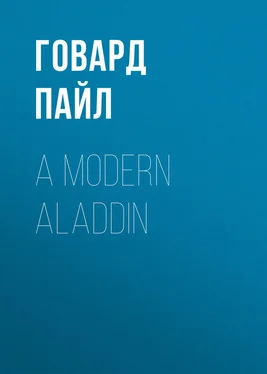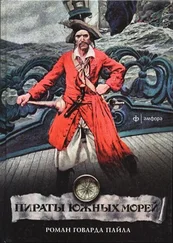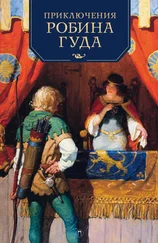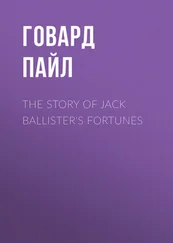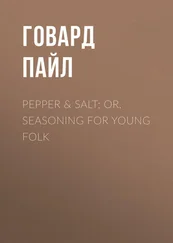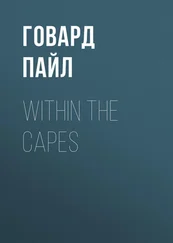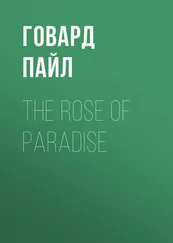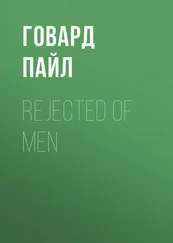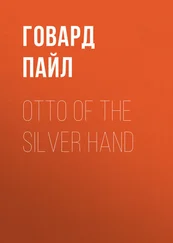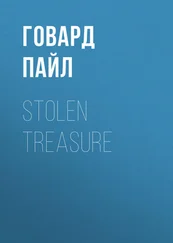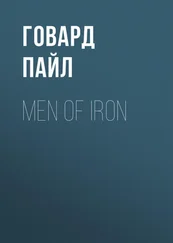Говард Пайл - A Modern Aladdin
Здесь есть возможность читать онлайн «Говард Пайл - A Modern Aladdin» — ознакомительный отрывок электронной книги совершенно бесплатно, а после прочтения отрывка купить полную версию. В некоторых случаях можно слушать аудио, скачать через торрент в формате fb2 и присутствует краткое содержание. Жанр: foreign_antique, foreign_prose, на английском языке. Описание произведения, (предисловие) а так же отзывы посетителей доступны на портале библиотеки ЛибКат.
- Название:A Modern Aladdin
- Автор:
- Жанр:
- Год:неизвестен
- ISBN:нет данных
- Рейтинг книги:5 / 5. Голосов: 1
-
Избранное:Добавить в избранное
- Отзывы:
-
Ваша оценка:
- 100
- 1
- 2
- 3
- 4
- 5
A Modern Aladdin: краткое содержание, описание и аннотация
Предлагаем к чтению аннотацию, описание, краткое содержание или предисловие (зависит от того, что написал сам автор книги «A Modern Aladdin»). Если вы не нашли необходимую информацию о книге — напишите в комментариях, мы постараемся отыскать её.
A Modern Aladdin — читать онлайн ознакомительный отрывок
Ниже представлен текст книги, разбитый по страницам. Система сохранения места последней прочитанной страницы, позволяет с удобством читать онлайн бесплатно книгу «A Modern Aladdin», без необходимости каждый раз заново искать на чём Вы остановились. Поставьте закладку, и сможете в любой момент перейти на страницу, на которой закончили чтение.
Интервал:
Закладка:
Howard Pyle
A Modern Aladdin / or, The Wonderful Adventures of Oliver Munier
PROLOGUE
The Comte de St. Germaine was a real historical character. Of all the many adventurers brilliant and volatile that flitted across the polished surface of Parisian life during the gay butterfly days of La Pompadour, none was more interesting, none left a more fascinating reflection, than he. No one knew who he was, no one knew his antecedents, no one knew whence he came, but there he suddenly appeared, to shine transiently and somewhat luridly for a year or two in a certain heaven of quasi high life.
Nothing could have been more sudden than his advent. One day he was unheard of; the next, all the world talked of him, gazed at him, and wondered. Great people adopted him and made much of him; courtiers and cabinet ministers bowed to him; the king petted him, talked with him in his privy closet by the hour, and held long and intimate discourse with him. He possessed the rare and distinguished privilege of a free and familiar entrée to Madame de Pompadour's dressing-room – a crowning honor, and one only enjoyed by the greatest and most favored courtiers.
And, indeed, the Parisian world had more cause to wonder and to marvel at him than at many another star that shone at different times in that firmament. First it was a whisper that got about that he was three, some said four, and others five hundred years old. Then it was said that there were those who had known him, gay, handsome, brilliant, fifty years before – as gay, as handsome, as brilliant. Then came a second whispering rumor – that he was the richest man in the world – a rumor also somewhat confirmed, for there were those, whose word was indisputable, who vouched to his having shown them incalculable treasures of diamonds. He himself never laid claim either to the extreme age or to the incalculable treasure, but the world claimed the one and talked of the other for him. And all the talk and gossip seemed to be built upon good foundation.
For example, said Madame de Pompadour to him one day, "But you do not tell us your age, and yet the Comtess de Gergy, who was ambassadress at Vienna more than fifty years ago, says that she saw you there then exactly the same as you now appear."
"It is quite true, madame," replied St. Germaine, quietly, "that I knew Madame de Gergy many years ago."
"But, according to her account, you must be more than a hundred years old?"
"That is not impossible," said he; and then added, laughing, "but it is quite possible that the countess is in her dotage."
As for his vast wealth, that also stood upon substantial foundation. The Baron de Sleichen says, in his Memoirs, that one day the count showed him so many diamonds that he thought he saw all the treasures of Aladdin's lamp spread out before him. He showed Madame de Pompadour a little box of precious stones worth more than half a million livres. Says Madame de Hausset: "The count came to see Madame de Pompadour, who was very ill. He showed her diamonds enough to furnish a king's treasury. At still another time, when a number of the principal courtiers were present, he visited madame's apartments wearing magnificent diamond knee and shoe buckles. At her request he went into an adjoining apartment and removed them for closer inspection. They were worth, M. de Gontat said, not less than twenty thousand livres."
So it came about that the Comte de St. Germaine shone, a brilliant star in his firmament, for a while; then suddenly he vanished, and the Parisian world saw him no more. For six days that world wondered and speculated concerning his disappearance; then, on the seventh day, it forgot him.
ACT I
Scene First. — A street in Flourens, the house of the late Jean Munier, tailor, in the foreground
Flourens was a little town lying quite out of the usual route of young English travellers of rich connections making the "grand tour," and so, having nothing to recommend it in itself, was unknown to the great world without – dull, stupid, stagnant. Hardly ever a visitor from that great outside world appeared within the circle of its hopeless isolation. So it was a very strange thing to the town when one morning a great coach, as big as a house, dragged by four horses, with postilions clad in scarlet faced with blue, their legs incased in huge jack-boots, and each with a club queue as thick as his wrist hanging down his back, came whirling, rattling, lumbering, in the midst of a swirling cloud of dust, into the silence of the town. It was twice wonderful when the coach stopped at the inn, and it was thrice wonderful when an odd, lean, wizened little man, evidently the servant, let down the steps and helped a strange gentleman from within. He was a tall, dark gentleman, dressed in black from head to foot – from the black hat with the black feather to the black silk stockings. From the gentleman's shoulder hung a long black cloak trimmed and lined with black fur, and Flourens had never seen his like before. He neither looked to the right nor to the left, but, without saying good or bad to any living soul, he and the odd, lean little servant entered the inn, leaving the crowd that stood without staring and gaping after him. Then the great coach disappeared through the arched gate that led to the stable-yard, but it was a long time before the crowd began to disperse, before the gossiping began to cease, before the cloud of silence and dullness and stagnation settled by degrees upon the town again. How it was maybe an hour and a half, and the last of those who had looked and wondered had gone about their business.
All is quiet, dull, heavily silent again, and in all the bald stretch of road nothing is to be seen but two women gossiping at a gate-way, and a solitary cat upon a garden wall watching two sparrows chirping and fluttering upon the eaves.
It is with this setting that the play opens, and Oliver Munier, the son of the late Jean Munier, is discovered leaning against the wall of the house, basking in the sun, his blouse tucked up, his hands in his pockets, and a straw in his mouth, which he now and then chews passively in drowsy laziness. Within, his mother is busied about the house-work, now and then rattling and stirring among the pots and pans, now and then scolding at him in a shrill, high-pitched voice, to which he listens with half-shut eyes, chewing his straw the while.
"I know not," said she, stopping for a moment in her work that her words might have more force in the pause – "I know not whether thou wert born so, but thou art the laziest scamp that ever my two eyes saw. Here art thou eighteen years old, and yet hast never earned a single sou to pay for keeping body and soul together since thy poor father died five months ago. Poor soul! with him it was snip, snip, snip, stitch, stitch, stitch. There was never a tailor in Picardy like him. His poor legs were bent like crooked billets from sitting cross-legged, and his poor fingers were as rough as horn from the prick of the needle. Thou lazy vagabond, with him it was work, work, work."
"Perhaps," said Oliver, without turning his head, "it was hard work that killed my poor father."
"Perhaps it was," said his mother; "but it will never do thee a harm."
Oliver shifted the straw he was chewing from one side of his mouth to the other. "Very well," said he. "Is not one in the family enough to die of the same thing?"
"Humph!" said his mother, and went back to her work with more clatter than ever.
Just then, at the farther end of the street, the inn door opened, and the strange gentleman in black came out, followed first by his servant, and then by Pierre, the landlord. He stopped for a moment at the head of a flight of stone steps, and Pierre pointed, as Oliver thought, towards their house. Then the strange gentleman came slowly down the steps, and picking his way around the puddles where the water from the trough flowed across the road and followed by his servant, came down the street towards where Oliver stood. At his coming a sudden breeze of interest seemed to awaken in the street. The two gossips turned and looked after him; the cat sat up on the wall, and also looked; and the two sparrows stopped chirping, and seemed to look. Two or three women appeared at the door-ways with children; three or four heads were thrust out at the windows, and Oliver, taking his hands out of his pockets, removed the straw that he might see better without the interruption of chewing.
Читать дальшеИнтервал:
Закладка:
Похожие книги на «A Modern Aladdin»
Представляем Вашему вниманию похожие книги на «A Modern Aladdin» списком для выбора. Мы отобрали схожую по названию и смыслу литературу в надежде предоставить читателям больше вариантов отыскать новые, интересные, ещё непрочитанные произведения.
Обсуждение, отзывы о книге «A Modern Aladdin» и просто собственные мнения читателей. Оставьте ваши комментарии, напишите, что Вы думаете о произведении, его смысле или главных героях. Укажите что конкретно понравилось, а что нет, и почему Вы так считаете.
